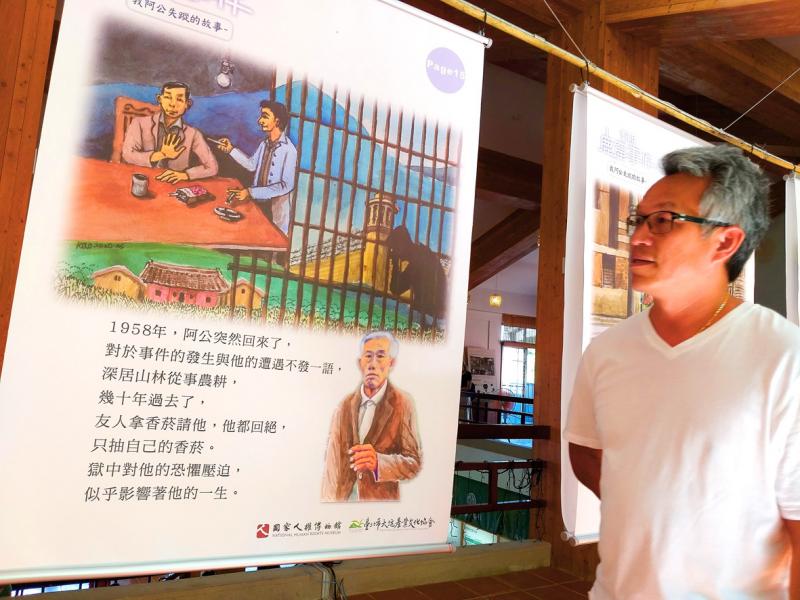The story of Luku Incident (鹿窟事件) victim Pan Ping-hui (潘炳輝), one of hundreds arrested during the White Terror era, is the focus of an exhibition at a tea factory in Taipei’s Nangang District (南港).
Chen Chun-hung (陳俊宏), director of the National Human Rights Museum, which organized the event, said the exhibition at the Nangang Tea Processing Demonstration Center, also known as the Taipei Tea House, is designed to keep the memories of the Luku Incident alive.
The 1952 incident refers to the arrest of more than 400 farmers and miners by the former Counterintelligence Bureau, which believed that there were underground communist organizations operating in what is now New Taipei City’s Shihding District (石碇), after it discovered the roster for a militia called the Northern Region Armed Committee.

Photo: Chen Yu-hsun, Taipei Times
Many of those arrested confessed to “crimes” after being tortured, and the number of people involved, along with some who were underage, marked the incident as the largest case of political oppression during the White Terror era.
Pan Shih-hsien (潘世賢) said his grandfather, Pan Ping-hui, never knew why he was arrested, and that his grandfather and father were reluctant to discuss it.
“My grandfather wasn’t well off and often had to promise to pay someone back when making purchases, especially pork,” he said, adding that at the time, people signed their names to certify that they owed money.
The bureau used a book of names from a shop as a list of communists in the area, and arrested all 50 people on the list, he said.
Pan Ping-hui was held for eight years, and then he was afraid to interact with people and so moved to the mountains to live alone, Pan Shih-hsien said.
“After the incident, my grandfather always refused any offer of even a cigarette, because he worried that it was a ploy to get him,” he said.
Pan Shih-hsien said he suspected that his grandfather had been tortured, as Pan Ping-hui’s fingernails were uneven.
His grandfather only started to talk about his past after the government offered redress on the issue, he said.
Pan Shih-hsien said his grandfather always told him not to speak about the government or politics, which Pan Shih-hsien said showed just how much his grandfather’s experience had scarred him.
The exhibition features works by artist Kao Teng-li (高燈立), including renditions of the Luku Incident memorial, Formosan sika deer, nearby mountains and other imagery that Kao said he had drawn from research and Pan Ping-hui’s recount of the incident.
Kao, a Luku resident, said that although he was not a descendant of any victim, he remembered villagers telling him to run if he saw a waishengren (外省人), a term referring to people who fled to Taiwan with the Chinese Nationalist Party (KMT) regime in 1949.
Kao said this showed the psychological trauma that had been inflicted on the previous generation.
The exhibit is free of charge and lasts until Nov 29.

A Vietnamese migrant worker on Thursday won the NT$12 million (US$383,590) jackpot on a scratch-off lottery ticket she bought from a lottery shop in Changhua County’s Puyan Township (埔鹽), Taiwan Lottery Co said yesterday. The lottery winner, who is in her 30s and married, said she would continue to work in Taiwan and send her winnings to her family in Vietnam to improve their life. More Taiwanese and migrant workers have flocked to the lottery shop on Sec 2 of Jhangshuei Road (彰水路) to share in the luck. The shop owner, surnamed Chen (陳), said that his shop has been open for just

Global bodies should stop excluding Taiwan for political reasons, President William Lai (賴清德) told Pope Francis in a letter, adding that he agrees war has no winners. The Vatican is one of only 12 countries to retain formal diplomatic ties with Taiwan, and Taipei has watched with concern efforts by Beijing and the Holy See to improve ties. In October, the Vatican and China extended an accord on the appointment of Catholic bishops in China for four years, pointing to a new level of trust between the two parties. Lai, writing to the pope in response to the pontiff’s message on Jan. 1’s

Actress Barbie Hsu (徐熙媛) has “returned home” to Taiwan, and there are no plans to hold a funeral for the TV star who died in Japan from influenza- induced pneumonia, her family said in a statement Wednesday night. The statement was released after local media outlets reported that Barbie Hsu’s ashes were brought back Taiwan on board a private jet, which arrived at Taipei Songshan Airport around 3 p.m. on Wednesday. To the reporters waiting at the airport, the statement issued by the family read “(we) appreciate friends working in the media for waiting in the cold weather.” “She has safely returned home.

TAKE BREAKS: A woman developed cystitis by refusing to get up to use the bathroom while playing mahjong for fear of disturbing her winning streak, a doctor said People should stand up and move around often while traveling or playing mahjong during the Lunar New Year holiday, as prolonged sitting can lead to cystitis or hemorrhoids, doctors said. Yuan’s General Hospital urologist Lee Tsung-hsi (李宗熹) said that he treated a 63-year-old woman surnamed Chao (趙) who had been sitting motionless and holding off going to the bathroom, increasing her risk of bladder infection. Chao would drink beverages and not urinate for several hours while playing mahjong with friends and family, especially when she was on a winning streak, afraid that using the bathroom would ruin her luck, he said. She had